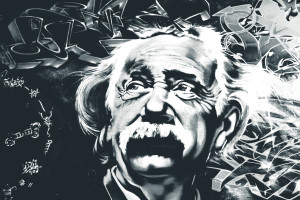
Sunday Snippets
 By Venkatesh Raghavan
By Venkatesh Raghavan
Several years back, I and a group of colleagues were discussing big names in science, politics, literature and music, the problems that arose in their lives besides the windfalls that helped them to hit the global stage. As the discussion progressed, there was an anecdote that illustrates how the phenomenon of professional jealousy affected the very cream of society, including top legends like Albert Einstein.
As the narrative goes, Werner Heisenberg, Neils Bohr and Albert Einstein were locked in a debate about the principle of uncertainty. While Heisenberg took pains to elucidate and restate his principle time and again, Albert Einstein responded with a thought experiment that would serve to defeat the proposition.
The team broke up for lunch and subsequently while returning to the discussion hall, Bohr openly confronted Einstein. “You should feel ashamed of yourselves. A person of your stature is acting out of jealousy.” Einstein then did admit that he felt jealous and had wished that he was the one who had proposed the theory.
Then our narrative went on to an instance in which a brilliant Indian mathematician had received timely support from an English professor by name Hardy. Hardy diligently went through the works of Srinivasa Ramanujam and rescued him from the clutches of a clerical education system. The genius, now dubbed as “The man who knew infinity” owes it to Hardy for bringing his brilliant efforts on the global stage.
Men and women of substance had at times met with adversities and there were times they were able to find their pot of gold at the end of a rainbow. As our conversation shifted to Calculus, there was an anecdote about how Sir Isaac Newton’s dog jumped over the table and caused the scientist’s last works and research papers to be completely charred. In fact, the story went on that though Newton did not grudge it a wee bit, Integral Calculus would have taken on a new dimension had those papers been saved from the fire.
The next in line was the narrative about the legendary American President, Abraham Lincoln. His journey that is typically described as the one from a log cabin to the White House, was punctuated with his access to only one story book in his younger days, that of Robinson Crusoe. It’s reported that Lincoln read and re-read the book for years as it was his sole literary companion in his formative years.
British poet, John Milton had faced his tryst with impaired vision bordering on blindness when he was yet to pen “Paradise Regained.” Fortunately for him, his daughter wrote down his odyssey that served the second part of the work now titled, “Paradise Lost, Paradise Regained.” Milton was also remembered for his participation proactively into ushering the libertarian era of the Press. Till his times, the press was expected to subscribe to the authoritarian theory which mandated only sources in authority can be reported in any journalistic work. The libertarian era witnessed several changes besides political and social satire.
Our discussion ended with happenings in the life of musical wizard John Lennon. It was cited that Lennon, when asked to write an essay on his ambitions during his school years, had stated, “I want to be a happy person.” Though stoutly criticized for his point of view, even today the view stands much relevant for the purpose of human existence.





